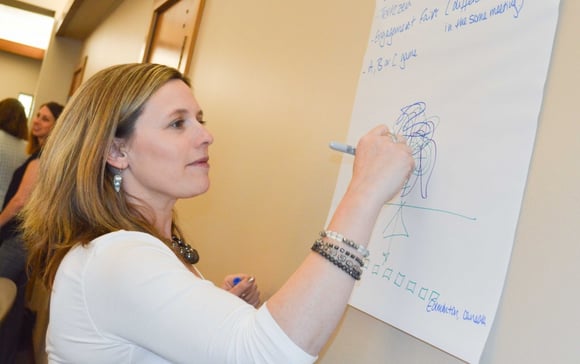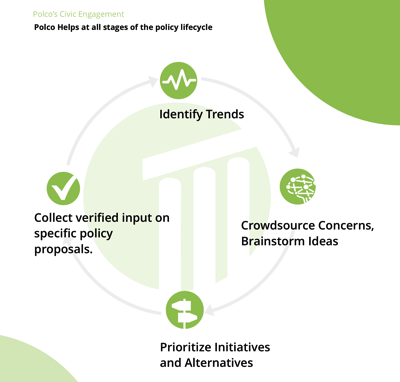How to Cultivate Civic Trust
By NRC on August 11, 2016

- By Angelica Wedell -
A top priority for local government leaders today sits in the arena of trust. “Civic trust is a topic that everyone is concerned with and everyone wants to get right,” said Nijah Fudge, West Regional Director for the Alliance for Innovation (AFI).

Nijah Fudge, AFI
And yet the public’s trust in government is at a low. Negative political cultures breed doubt in government at the federal level and seep into government at the local level. “Maybe all of us are getting lumped into ‘government’ and what ‘government’ is and how we behave together,” said Allison Scheck, Marketing and Community Relations Manager for the City of Lakewood, at an Innovation Lab hosted by AFI on the topic of civic trust.

Allison Scheck, City of Lakewood. AFI Innovation Lab
Simultaneously, citizens expect more from government than ever before. “Technology has progressed so much that residents have higher expectations of access to information, the type of information, the frequency of communication, customer service … And frankly, local government has struggled to respond,” commented Kim Newcomer, CEO and Founder of Slate Communications, who has 17 years of experience with public communications and outreach.

Kim Newcomer, Slate Communications. Courtesy Slate Communications
To say the least, building trust is complicated by lack of understanding and engagement. “People who are often critical don’t have any idea of the realities of local government,” said Dave Pickett, Division Chief of Support Services for the City of Wheat Ridge. “We need to better educate people and show them that it’s about dealing with your neighbors, not about government intervention.”

Dave Pickett, City of Wheat Ridge with Cheezo, Internet Safety Program mascot. Courtesy Dave Pickett
Local government thought leaders agree that civic trust largely depends upon civic engagement. This is a challenge when substantial portions of the population are disconnected from community decision-makers. And unfortunately, instances of engagement are usually the result of distrust. “Most of the engagement that occurs is around things that draw people out of their homes because they feel they have to talk to their elected officials or something bad will happen to them. The pot holes won’t be repaired or the firing range will be built near their backyard,” Tom Miller, President of National Research Center, Inc. (NRC), described conclusions derived from decades-worth of citizen data and research. “Then if the decision doesn’t support their perspective, they feel they haven’t been heard.”

Tom Miller, NRC
Addressing the Challenges
These issues compel communities to innovate and try emerging practices. “We have to push the envelope and take risks. But with risk comes the chance of failure,” said Pickett.
Newcomer agreed that the risks may be worth taking. “Some of those tools and practices are new, but if they’re the best way to reach your audience, then they are probably worth a shot.”
When considering a new practice, experts advise local government leaders to first put a strategy in place. They should understand the goals and consequences, the type of feedback needed and how to use that information. Miller said, “To help you know what practices to try in your community, it’s good to have on staff or hire consultants who are experts in research and evaluation.”
A crucial step to success is letting the public know that this new practice is an experiment. “We like the term pilot project,” Pickett emphasized. “And then we measure the results.”
“Just like any other big strategic goal, if civic trust is a priority for your organization then it needs to be resourced and held accountable for,” Newcomer said, adding that transparency throughout the entire process is critical. “We get feedback from the community, and then we use it. But we sometimes forget to tell them how we used it. Closing that credibility loop is a big component to building trust.”
Defining Civic Trust
Newcomer recalled a conversation she’d had with her father after he’d moved to Fort Collins, CO from New York. “I asked him if he was voting for the new tax initiative and he said, ‘Of course I’m voting for it. You know what I can’t even believe? The City of Fort Collins actually does what they say they are going to do.’”
Citizens are more trusting when they perceive that their government will keep its promises. “Public trust can be defined as the extent to which citizens trust the government to do what is right, to do it honestly, to do it fairly and to do it efficiently,” NRC stated in Analysis of Public Trust Survey (2012).
“When we ask residents about their trust in their local government and the quality of the services that they receive, these ratings remain as high or higher than they’ve been even before the recession,” Miller said. The task of improving civic trust is massive and intangible. But it is heartening to know that the efforts of local governments are working.
This article originally appeared on the Alliance for Innovation website, transformgov.org.
Related Articles
Popular posts
Sign-up for Updates
You May Also Like
These Related Stories

The Compounding Effect of Civic Engagement

Strengthening Trust in Local Government



